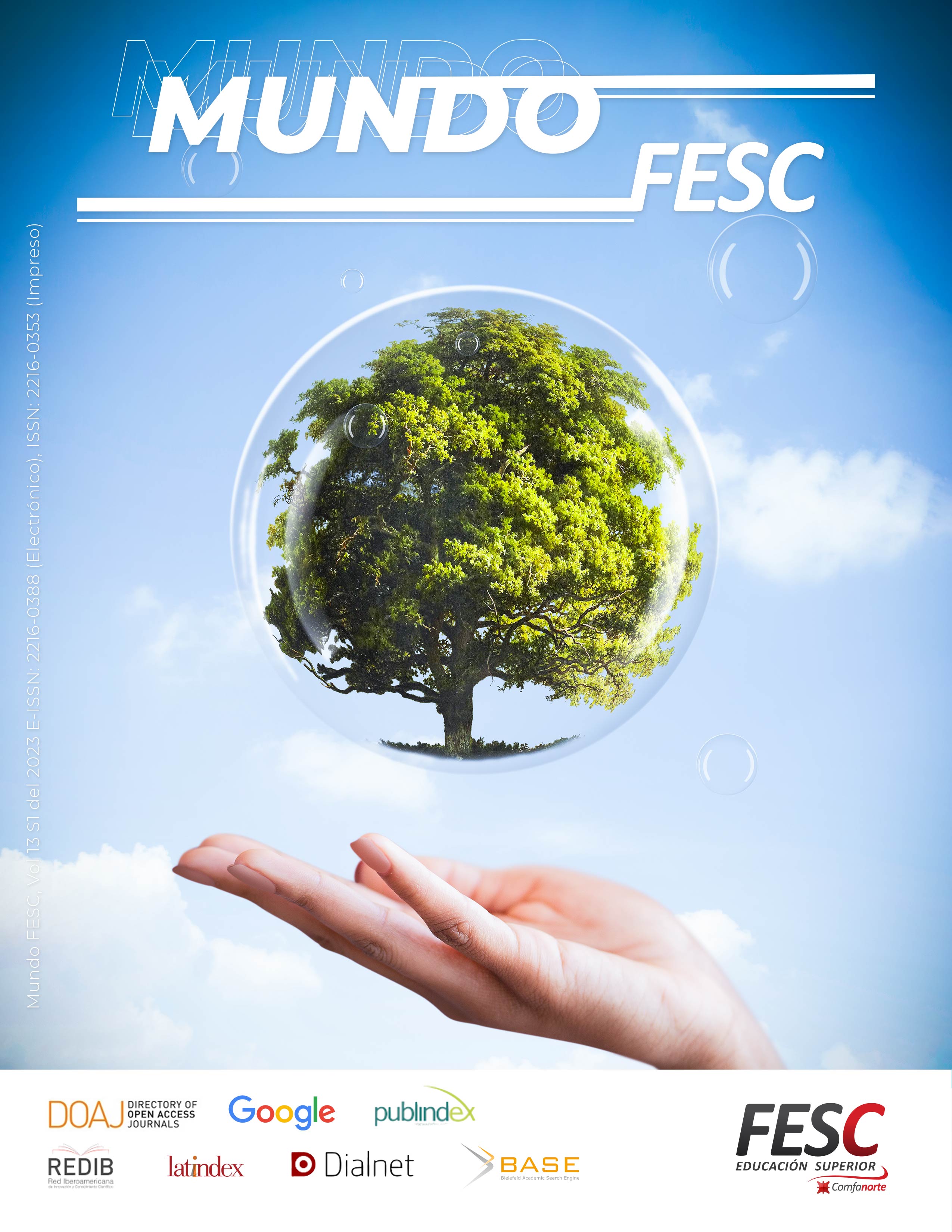The SDSs in business school: How much progress have we made?
DOI:
https://doi.org/10.61799/2216-0388.1793Keywords:
Agenda 2030, Higher Education, Sustainability, SDGsAbstract
The year 2030 will be the time to report on the scope of the Sustainable Development Goals - SDGs - at a global level. After their release in 2015 by the United Nations, with the need to achieve a fairer planet for all and sustainable in the face of the threats of climate change, all countries, regardless of their size or economy, joined this global pact to link internal actions aimed at achieving the goals set for each of the objectives. For this research, we seek to analyze how much has been achieved in training and dissemination of the SDGs and in particular in Business Administration schools. It is a documentary-type research, which also links the perception of UNIMINITO virtual Business Administration students about the SDGs, the aim is to investigate how much we have advanced with our students. The research has identified that although actions have been taken to communicate and take action on the SDGs in the Business Administration programs, there is no uniform follow-up in all HEIs and not all SDGs are incorporated into the training strategy.
Downloads
References
[1] M. d. l. Á. Cervantes Rosas, R. E. De Anda Montaño, R. Portillo Molina y D. I. Rojas Escárrega, «Las instituciones de educación superior y el desarrollo sostenible: una aproximación a las prácticas en universidades sinaloenses,» RILCO:Revista de Investigación Latinoamericana en competitividad Organizacional, vol. 6, nº 21, pp. 30-43, 2024. DOI: https://doi.org/10.51896/rilco.v6i21.419
[2] G. d. S. García Luján Ávila y S. Albareda-Tiana, «Igualdad de género y desarrollo sostenible. Avances y desafíos en la agenda mundial y en la universidad,» Feminismo/s, nº 43, pp. 213-243, 2024. DOI: https://doi.org/10.14198/fem.2024.43.09
[3] R. Hernández-Sampieri y C. P. Mendoza Torres, Metodología de la investigación: las rutas cuantitativa, cualitativa y mixta, Ciudad de México: McGraw, 2018.
[4] U. CRES, «Declaración de la III Conferencia Regional de Educación Superior para América Latina y el Caribe,» Integración y Conocimiento: Revista del Núcleo de Estudios e Investigaciones en Educación Superior de Mercosur, vol. 7, nº 2, pp. 96-105, 2018. DOI: https://doi.org/10.61203/2347-0658.v7.n2.22610
[5] C. B. Ruiz y R. Cortés Borrero, «La universidad contemporánea a través de los Objetivos del Desarrollo Sostenible y un mundo pos-covid-19,» Episteme. Revista de divulgación en estudios socioterritoriales, vol. 15, nº 1, pp. 8-23, 2023. DOI: https://doi.org/10.15332/27113833.8459
[6] S. Australia/Pacific, Getting started with the SDGs in universities: a guide for universities, higher education institutions, and the academic sector, Melbourne: Sustainable Development Solutions Network – Australia/Pacific, 2017.
[7] P. F. Cisneros Quintanilla y K. L. Mendoza Bravo, «Vinculación Universidad - Sociedad: espacio para generar creatividad e innovación,» Killkana sociales: Revista de Investigación Científica, vol. 2, nº 2, pp. 53-58, 2018. DOI: https://doi.org/10.26871/killkana_social.v2i2.304
[8] UNESCO Global Independent Expert Group on the Universities and the 2030 Agenda, Knowledge-driven actions: transforming higher education for global sustainability, Paris: UNESCO, 2022.
[9] C. H. González-Campo, D. Ico-Brath y G. Murillo-Vargas, «Integración de los objetivos de desarrollo sostenible (ODS) para el cumplimiento de la agenda 2030 en las universidades públicas colombianas,» Formación universitaria, vol. 15, nº 2, pp. 53-60, 2022. DOI: https://doi.org/10.4067/S0718-50062022000200053
[10] S. García Caballero y J. M. Herranz de la Casa, «La Agenda 2030 en las universidades españolas: la estrategia comunicativa de los Objetivos de Desarrollo Sostenible,» Revista Iberoamericana de Economía Solidaria e Innovación Socioecológica, vol. 4, pp. 127-147, 2021. DOI: https://doi.org/10.33776/riesise.v4i1.5246
[11] C. Aguilar y E. Ávalos, «Contribución de la educación superior en el cumplimiento de la agenda 2030,» Revista Mexicana de Economía y Finanzas (REMEF), vol. 17, nº 4, 2022.
[12] Pacto Global Red Colombia, «Estas son las universidades colombianas que más cumplieron con los ODS a nivel mundial,» Junio 2024. [En línea]. Available: https://www.pactoglobal-colombia.org/news/estas-son-las-universidades-colombianas-que-mas-cumplieron-con-los-ods-a-nivel-mundial.html. [Último acceso: 1 Noviembre 2024].
[13] K. Pinto Duitama, «Las universidades colombianas que mejor le aportan a los ODS según nuevo ranking,» La Republica, 18 Junio 2024. [En línea]. Available: https://www.larepublica.co/globoeconomia/las-universidades-colombianas-que-mejor-le-aportan-a-los-ods-segun-nuevo-ranking-3882532. [Último acceso: 1 Noviembre 2024].
[14] Times Higher Education (THE), «Top universities pursuing sustainable development goals in 2024,» [En línea]. Available: https://www.timeshighereducation.com/impactrankings#!/length/25/locations/COL/sort_by/rank/sort_order/asc. [Último acceso: 7 Septiembre 2024].
[15] Á. M. Plata Rangel, M. T. Holguín Aguirre, O. Sáenz Zapata, W. M. Mora Penagos y M. M. Callejas Restrepo, «Compromiso de las universidades colombianas con la sustentabilidad,» Educación y Educadores, vol. 23, nº 2, pp. 159-178, 2020. DOI: https://doi.org/10.5294/edu.2020.23.2.1
[16] A. J. Uribe Arévalo y J. A. Perea Sandoval, «Participación política de la mujer colombiana, y el compromiso de las Escuelas de Administración,» Mundo Fesc, vol. 13, nº 27, pp. 21-37, 2023. DOI: https://doi.org/10.61799/2216-0388.1321
[17] J. J. Saavedra Mayorga, «Una aproximación a las demandas sociales de las escuelas de Administración en Colombia,» Universidad & Empresa, vol. 6, nº 12, pp. 74-116, 2007.
[18] A. Sanz-Hernández y P. Jiménez-Caballero, «Transiciones de sostenibilidad y género: oportunidades para el cambio institucional,» de Cambio Inesperado. Educación Inclusiva y Comunicación Responsable Ante La Vulnerabilidad Sobrevenida, Dykinson, S.L., 2021, pp. 289-302. DOI: https://doi.org/10.2307/j.ctv2gz3rz8.26
[19] A. Berríos Villarroel y L. S. Bastías Bastías, «Aproximación a las percepciones de los estudiantes de pedagogía hacia la Agenda 2030 para el desarrollo sustentable,» Revista de estudios y experiencias en educación, vol. 20, nº 43, pp. 113-128, 2021. DOI: https://doi.org/10.21703/rexe.20212043berrios6
[20] Ó. I. Pérez, M. C. Romero y P. Vargas González, «Interacciones y sinergias entre ODS: un análisis desde la responsabilidad social en Colombia,» Desarrollo y Sociedad, nº 86, pp. 191-244, 2020. DOI: https://doi.org/10.13043/DYS.86.6
[21] T. Wing-Lam-Wu-Wu y J. Gómez, «El Rol del administrador y la importancia del desarrollo sostenible en las organizaciones,» Revista Saber, Ciencia Y Libertad En Germinación, vol. 13, pp. 137-144, 2020.
Published
Issue
Section
License
Copyright (c) 2025 Mundo FESC Journal

This work is licensed under a Creative Commons Attribution-NonCommercial 4.0 International License.






